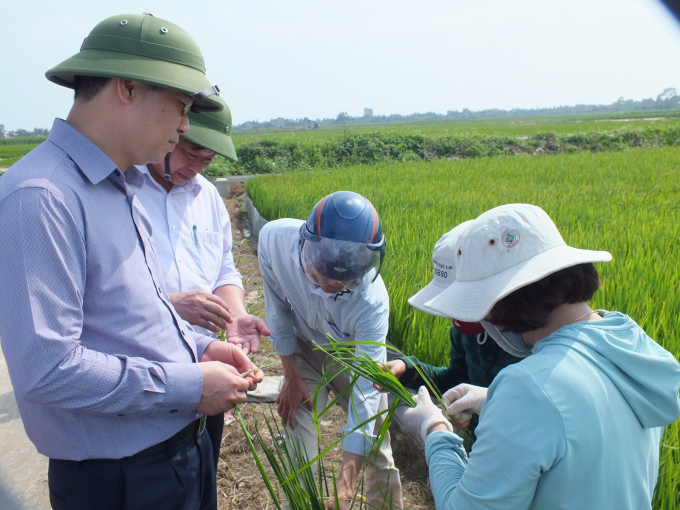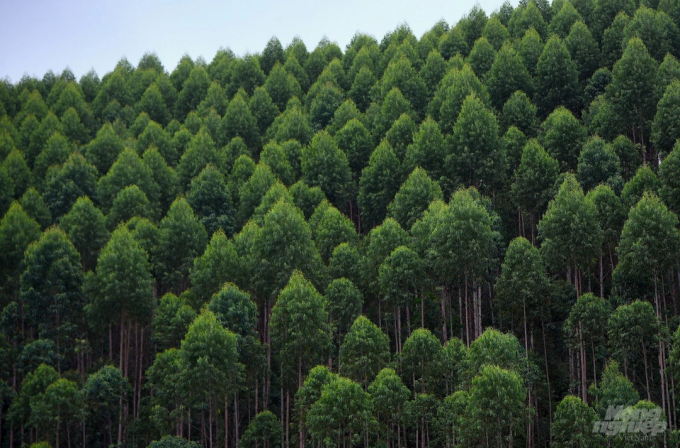November 25, 2025 | 12:52 GMT +7
November 25, 2025 | 12:52 GMT +7
Hotline: 0913.378.918
November 25, 2025 | 12:52 GMT +7
Hotline: 0913.378.918

Minister of Agriculture and Rural Development Nguyen Xuan Cuong addressed the issues raised by delegates at the Nov 3rd morning session, the 10th session of the 14th National Assembly. Photo: Minh Phuc.
In the first half of the Nov 3rd morning session at the National Assembly, there were 7 comments from delegates (including 4 directly related to the agricultural sector).
Most of the comments focused on hot issues such as forest quality degradation that resulted in extreme weather events; Shortcomings in the control of fertilizers and plant protection drugs; and the need for a sustainable development policy for the Mekong Delta.
Minister of Agriculture and Rural Development Nguyen Xuan Cuong affirmed that agriculture is aiming at creating clean products. In 2016, the production of fertilizers and plant protection drugs grew out of control.

The rate of using biological plant protection products has increased to 20%. Photo: NNVN.
At that time, we used over 10 million tons of fertilizers and mostly inorganic fertilizers. But so far, we have increased our organic fertilizer production by almost 4 million tons. This is a very positive progress.
In addition, we now have more than 243,000 ha in 45 provinces/cities for organic agricultural production and Vietnam exported US$ 235 million of organic agricultural products in 2019 while only imported 75,000 tons of plant protection drugs, of which 20% is of biological origin.
Regarding the issue of sustainable forest development, Minister Nguyen Xuan Cuong said that at present we have about 14.6 million ha of forest. This is an extraordinary attempt of the political system and the people.

Vietnam’s participation in sustainable development has been recognized. Photo: Dinh Tung.
Our current forest cover is close to 42% while the world average is 29%. Out of 4.3 million hectares of planted forests, we have produced 30 million cubic meters of raw materials for the 4,600 processing enterprises of forestry sector. This year, we can export up to US$ 13 billion of forest products.
As for natural forests, the Party, State, National Assembly, and Government always come up with better policies for people to keep the targeted 1 million hectares of forest.
Thanks to the policy of paying for forest environment services, we are able to mobilize VND30,000 billion. On October 20th, 2020, Vietnam officially signed a cooperation agreement on carbon credits from forests. As a result, we sell 10 million cubic meters of CO2 at US$5 for every 1m3 of CO2.
“Vietnam’s participation in sustainable development has been recognized, thereby gaining more than VND 1,000 billion for 6 central provinces. At the same time, it shows that Vietnam is engaged to sustainable development”, said Minister Nguyen Xuan Cuong.
It is a good sign that we are shifting from nature exploitation to nature-centered approach. Therefore, in the past four years, 400,000 ha of rice land has been converted to aquaculture and fruit trees cultivation. This is a big progress in agricultural development of 13 provinces in the Mekong Delta.
Author: Minh Phuc. Translated by Meagan Phan. Edited by Duc Huy.

(VAN) The Ministry of Agriculture and Environment must spearhead the construction of green governance, spanning decision-making processes and investment standards to policy evaluation mechanisms.

(VAN) The Agriculture and Environment sector of Khanh Hoa has achieved numerous milestones over the past 80 years, contributing significantly to the goal of establishing the province as a centrally governed city by 2030.

(VAN) Viet Nam is entering the pivotal period of 2025-2030, moving toward the formulation of the Remote Sensing Law, which will establish a legal foundation for the development of national digital data.

(VAN) The agricultural sector is finalizing the strategic framework for emission reduction, setting the goal of sharply cutting methane and 403.7 million tons of CO2 equivalent and moving toward Net Zero by 2050.
/2025/11/22/2236-1-153832_483.jpg)
(VAN) The National Marine Spatial Planning is opening up opportunities for sustainable blue sea development across 21 coastal localities.

(VAN) Viet Nam’s forestry sector is undergoing a comprehensive transformation, strengthening management, protection, and development efforts to maintain ecological security and drive green, sustainable growth.

(VAN) Viet Nam is accelerating efforts to digitize reservoir operations, from real-time data to hydraulic modelling.